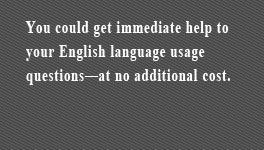There Is No 'Proper English'

Never mind the grammar scolds. If people say it, it's the right way to speak

The New York Times January 18, 2014

It is well past time to consign grammar pedantry to the history books. PHOTO: GETTY IMAGES
It’s a perpetual lament: The purity of the English language is under assault. These days we are told that our ever-texting teenagers can’t express themselves in grammatical sentences. The media delight in publicizing ostensibly incorrect usage. A few weeks ago,pundits and columnists lauded a Wikipedia editor in San Jose, Calif., who had rooted out and changed no fewer than 47,000 instances where contributors to the online encyclopedia had written “comprised of” rather than “composed of.” Does anyone doubt that our mother tongue is in deep decline?
Well, for one, I do. It is well past time to consign grammar pedantry to the history books.
As children, we all have the instinct to acquire a set of rules and to apply them. Any toddler is already a grammatical genius. Without conscious effort, we combine words into sentences according to a particular structure, with subjects, objects, verbs, adjectives and so on. We know that a certain practice is a rule of grammar because it’s how we see and hear people use the language.
That’s how scholarly linguists work. Instead of having some rule book of what is “correct” usage, they examine the evidence of how native and fluent nonnative speakers do in fact use the language. Whatever is in general use in a language (not any use, but general use) is for that reason grammatically correct.
The grammatical rules invoked by pedants aren’t real rules of grammar at all. They are, at best, just stylistic conventions: An example would be the use of a double negative (I can’t get no satisfaction). It makes complete grammatical sense, as an intensifier. It’s just a convention that we don’t use double negatives of that form in Standard English.
Some other pedantic stipulations are destructive pieces of folklore, like the belief that it is wrong to split an infinitive or to end a sentence with a preposition. We should be entirely relaxed about that sort of choice. Why worry, as some pedants do, about whether to write “firstly” or “first” when you begin a list of points? Either is correct.
The range of legitimate variation is wider than you would imagine. Yes, you may use “hopefully” as an adverb modifying an entire sentence; and you may use “they” as a singular generic pronoun; and you may say “between you and I.” The pedants’ prohibitions on constructions like these are not supported by the evidence of general usage.
Pedantry is poor manners, certainly, but also poor scholarship. If someone tells you that you “can’t” write something, ask them why not. Rarely will they have an answer that makes grammatical sense; it is probably just a superstition that they have carried around with them for years.
It is possible, of course, for us to make errors of grammar, spelling or punctuation. But it is not possible for everyone, or the majority of educated users of the language, to be wrong on the same point at the same time. If it is in general use, then that is what the language is.
Language sticklers typically depict themselves as defenders of tradition against the insidious forces of cultural relativism. This is nonsense. In fact, the pedantic urge is a modern invention of rather dubious lineage. Prescriptive style guides like Strunk & White’s “Elements of Style” are the direct descendants of 18th-century grammarians who first defined what it was to speak “proper English.” In fact, these grammarians really just meant the dialect that grew up in and around London; their manuals were intended to teach propriety to an emerging merchant class.
Such self-help books were phenomenally popular in the 18th and 19th centuries, and instruction in correct speaking was a subset of these. Hence, for example, as a boy George Washington was required by his tutor to copy out “110 Rules of Civility and Decent Behavior in Company and Conversation.” These largely concerned deference to his social superiors. That is how the prescriptive urge in language started too. Robert Baker, one of the original 18th-century usage gurus, criticized “low people,” especially servants and actors, for their standards of English.
The whole debate about English usage has been bedeviled ever since by this snobbery, whereas the real task of language instruction (for adults as for children) should be to help people learn how to address different types of audience at different sorts of occasions. A speech delivered at a public event marking a great tragedy, for instance, demands a highly formal register; commentary on the Super Bowl needs a conversational tone. If you mix them up, you have failed not just in standards of language but in proper behavior as well.
Though the U.S. has long been regarded as a more mobile and less class-stratified society than the U.K., the same linguistic controversies rage in both countries. The founding father of a distinctive American dialect was Noah Webster, whose American Dictionary of the English Language was published in 1828. He was notably more enlightened in his views than his counterparts in England, Robert Lowth and Lindley Murray; Webster focused on how Americans used the language rather than on the superstition that English must follow the syntax of Latin.
But the urge to scold rather than to listen has run through American discussions of usage ever since. There was huge controversy when the third edition of Webster’s dictionary was published in 1961 and announced that it was less interested in “correctness” than in how actual Americans spoke and wrote. It caused outrage. The literary critic Dwight Macdonald complained that the lexicographers had “untuned the string, made a sop of the solid structure of English.”
The critics had misjudged what a dictionary is for. Lexicographers don’t have the option of recording only the usages they approve of. They have to describe the language as it is, knowing that there is no one in charge of it. Indeed, there is no single body of definitions that can be identified definitively as English. There are different dialects of English, all of which conform to grammatical structures. Usage is not just usage: It is what the language is.
Once we dispense with the idea that Standard English is “correct,” there are social and linguistic gains. Teaching the conventions of the language is vital but has long been bound up with two deeply mistaken beliefs: first that non-Standard dialects are “improper” English; and second, that literacy depends on bogus rules like the supposed ban on split infinitives (“to boldly go”).
People should not be stigmatized for the way they speak, and they certainly should not have stupid, made-up linguistic superstitions drilled into their heads.
— Mr. Kamm is an editorial writer and columnist for the Times of London. His latest book is “Accidence Will Happen: The Non-Pedantic Guide to English Usage.”
 +7 (495) 969-87-46
+7 (495) 969-87-46





















